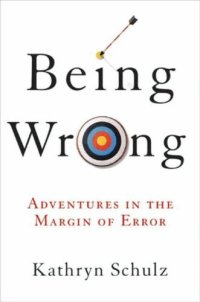
Ebook: Being Wrong: Adventures in the Margin of Error
Author: Kathryn Schulz
From Publishers Weekly Starred Review. In the spirit of *Blink* and *Predictably Irrational* (but with a large helping of erudition), journalist Schulz casts a fresh and irreverent eye upon the profound meanings behind our most ordinary behaviors—in this instance, how we make mistakes, how we behave when we find we have been wrong, and how our errors change us. [I]t is ultimately wrongness, not rightness, that can teach us who we are, she asserts. Schulz writes with such lucidity and wit that her philosophical enquiry becomes a page-turner. She deftly incorporates Wittgenstein, Descartes, and Freud, along with an array of contemporary social scientists and even a spin with Shakespeare and Keats. There's heavy stuff here, but no heavy-handedness. Being wrong encompasses the cataclysmic (economic collapse) and the commonplace (leaving a laptop in front of the window before the storm). Being wrong may lead to fun (playing with and understanding optical illusions) or futility (the Millerite expectation of the Rapture in 1844). Being wrong can be transformative, and Schultz writes, I encourage us to see error as a gift in itself, a rich and irreplaceable source of humor, art, illumination, individuality, and change—an apt description of her engrossing study. *(June)* Copyright © Reed Business Information, a division of Reed Elsevier Inc. All rights reserved. From Booklist Here’s a fascinating counterpoint to the notion that making a mistake somehow diminishes you as a person. We shouldn’t fear error, the author says; rather, we should embrace it because it’s our capacity for making mistakes that makes us who we are. (“To err is human” isn’t just an empty cliché.) Schulz explores the nature of error: are big mistakes fundamentally different from small mistakes, or are they all essentially the same? How much does peer pressure, or crowd response, affect our capacity to blunder? How and why do we remember relatively insignificant mistakes for the rest of our lives, long after they have ceased to be relevant to anything? And what role does “error-blindness”—our inability to know when we are in the process of making a mistake—play in our daily lives? Schulz writes in a lively style, asks lots of compelling questions, and uses plenty of examples to illustrate her points. Put this one in the same general category as Gladwell’s Blink (2005), LeGault’s Think! (2006), and Shore’s Blunder (2008): user-friendly, entertaining looks at the way our minds work. --David Pitt
Download the book Being Wrong: Adventures in the Margin of Error for free or read online
Continue reading on any device:

Last viewed books
Related books
{related-news}
Comments (0)